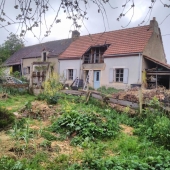posted 13 years ago
All good comments... thanks.
I agree wholeheartedly with stacking functions... whether in your planting design or utilizing structures. Rather than tear down the 80-100 year old sheds / barn on the property, we are trying to work within the century old worn footprint to revitalize the structures to bring usefulness and efficiency to the overall farmstead development. One shed will continue to be used for general storage, while also housing irrigation equipment and repair, as well as house our beehives & equipment.... we will build an additional 20x20 space off the end to act as a meat shed with adjoining holding pen (this space will be for harvesting animals, processing, skinning, hanging, etc). A new shop to be built will handle wood working, welding and tractor storage / maintenance, as well as renewable energy battery storage & farm office. Any interior shelving or tables will be on rollers to afford moving to house workshops, group events, etc. We are presently designing for a renovation of the barn to accommodate cow/goat milking station, chicken coop, several back-up stalls, misc equipment storage, cider room storage and comm'l kitchen for finish processing of various edibles. There remain a few more needs to be met with structure development, but time will dictate efficiency of placement, size, & use.
The book referenced had a thorough Table of Contents, and looks to have some really useable info inside. My best reference to date has been speaking with generational farmers who have come up the ranks from child to parent on the farm. They have refined the process of stall sizes, daily chore efficiencies, etc., and know the tried and true ways to get things done properly. Speaking with folks in the trenches (much like what we are doing here) make some good sense.
Still waiting to see where we will store / build space for firewood, tractor implements, hazardous liquids (gas, diesel, chain oil, etc) from the kiddies, greenhouse... what else?? Time will tell.
Best of luck to all in their endeavors.
Tim Southwell
www.abcacres.com
www.facebook.com/abcacres
Youtube: ABC acres








































